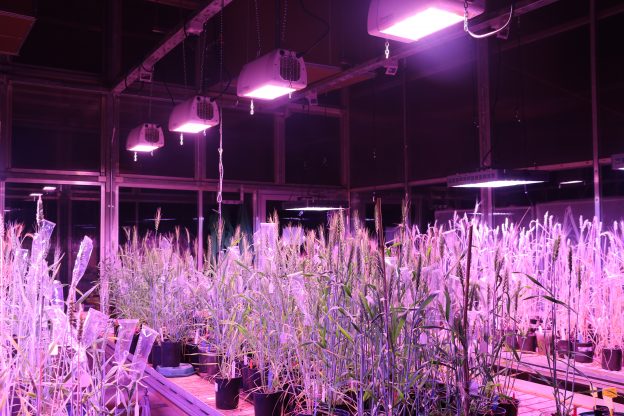Speed Breeding is a new and exciting approach to breeding originally inspired by the US National Aeronautics and Space Administration (NASA) that promises to develop new crop varieties faster, offering hope for food security in the continent. Through Speed Breeding, African researchers are working to develop new crop varieties faster.
The technique involves growing plants under continuous light (20–22hours). This allows plants to photosynthesize for longer, resulting in faster growth. With this technique, four to six generations of wheat plants can be grown per year instead of two generations under normal growth conditions. The result is researchers develop new crop varieties quicker.
Researchers at the Biosciences eastern and central Africa–International Livestock Research Institute Hub, known as the BecA-ILRI Hub and the John Innes Centre, UK, are bringing the benefits of Speed Breeding to Africa. Scientists Peter Emmrich and Oluwaseyi Shorinola are applying Speed Breeding to grass pea and wheat breeding in Africa, demonstrating that the technique can be used for major and orphan crop breeding.

Shorinola is developing new wheat lines that have seen increased grain size and protein content and that are resistant to major wheat diseases in East Africa. His research has already resulted in faster growth of wheat plants under Speed Breeding conditions in Africa.
‘Speed breeding is such a simple way of growing plants faster. Unlike many advanced technologies that do not easily translate to Africa, Speed Breeding can easily be adopted by African breeders to accelerate their work. There is no “magic” or complicated science behind it; we are simply using LED lights to extend the length of day for plants, and this makes plants grow faster’, remarks Shorinola.
Emmrich is working on eradicating the toxin produced in grass pea, making it safe to eat in East Africa. Speed Breeding is helping the researchers to breed the low-toxin trait developed at the John Innes Centre, UK, into high-yielding varieties that are adapted to East Africa.
Grass pea is great at surviving extreme weather conditions such as drought and flooding, so the researchers hope non-toxic varieties will contribute to maintaining food and nutritional security as climate change progresses, especially in Ethiopia, where grass pea is already widely consumed.
According to Emmrich: ‘The amount of power needed for the lights and temperature control makes this too expensive for farmers to use. Breeders, however, often have to put their plants through many generation cycles, and in this context Speed Breeding can save both time and money. That means improved varieties can be made available quicker.’
Recognizing the potential of Speed Breeding for accelerating crop improvement in Africa, the BecA-ILRI Hub is planning to expand its Speed Breeding capacity and to integrate it with other modern technologies like gene editing and genomic selection and to make it accessible to African researchers.

Cathrine Ziyomo, BecA-ILRI Hub’s Program lead, says that most of the crops that make significant contributions to Africa’s food security have a lengthy generation time and complex biology. She adds that Speed Breeding presents researchers and plant breeders with unique opportunities to fast track genetic improvements for important traits.
‘We hope that by establishing a Speed Breeding platform in Africa, the Hub can simultaneously increase access to modern and innovative methods of crop improvement while increasing the efficiency and cost-effectiveness of breeding for under-researched crops’, says Ziyomo.
Shorinola and Emmrich’s research is done in partnership with the John Innes Centre, with support from the Royal Society and Biotechnology and Biological Sciences Research Council (BBSRC), UK.
Africa sits at the frontline of a changing climate system and is very vulnerable to climate change. Agriculture in sub-Saharan Africa needs a boost to feed the 600 million people currently experiencing food insecurity, and the extra 1 billion people expected to live in the next 30 years on the continent. In this light, developing better yielding and more nutritious, climate-resilient crop varieties faster is a major priority for Africa’s researchers.
